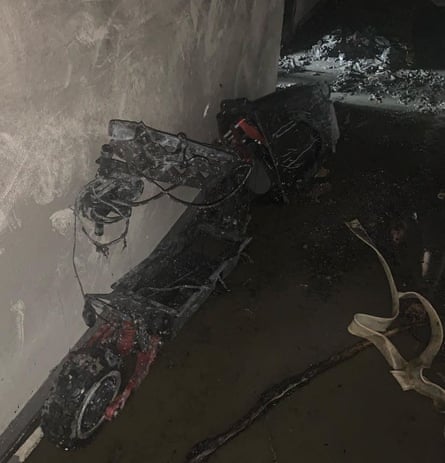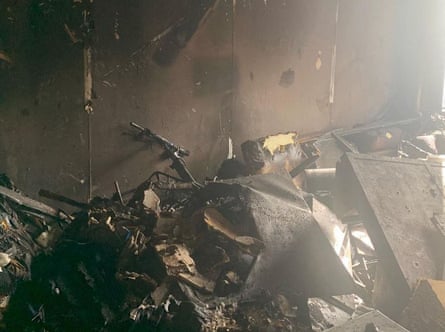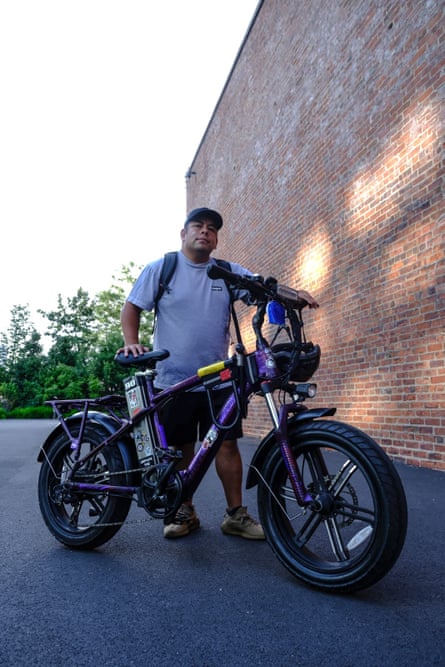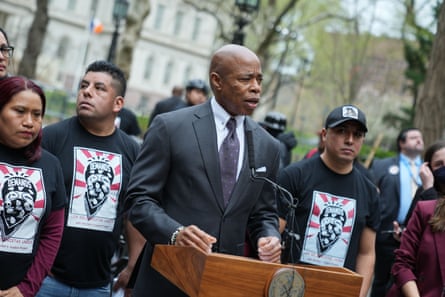New York City supply employees have to take care of an array of threats: rushing automobiles, risky climate, armed robbers and app algorithms that may “deactivate” them in the event that they don’t rush to prospects shortly sufficient. Lately, employees have added one other to the record – their electrical bikes bursting into flames.
The highly effective lithium ion batteries used in small electrical automobiles are answerable for a rising epidemic of fires. This 12 months, there have been about 200 fires and 6 deaths, in keeping with the New York City fireplace division. This month, an e-bike fireplace inside a Manhattan high-rise residence turned an inferno that injured practically 40 folks and compelled firefighters to evacuate residents utilizing ropes.
These fires can unfold shortly and out of the blue: “We have a fully formed fire within a matter of seconds,” the chief fireplace marshal mentioned at a news convention.
That’s change into a day by day concern for supply employees reminiscent of Delores Sampson, a 64-year-old Brooklyn resident who has been working for Uber Eats for about two years to subsidize her social safety advantages. Sampson mentioned she “lives in fear” that her automobile may catch fireplace whereas it’s charging and even whereas she’s using it. Last 12 months, whereas delivering meals on her mobility scooter, Sampson hit a pothole, inflicting the battery to fly out and hit the pavement, the place it burst into flames. “It was like a big popping sound,” she informed the Guardian. “It scared me – like, ‘Damn, if that would’ve happened on the bike, I would’ve been blown up.’”




As the densest metropolis in America, New York is a micro-mobility haven. Here, small electrical automobiles aren’t toys for weekend jaunts however very important instruments for the estimated 65,000 supply employees making an attempt to scrape a residing by way of low-paying apps.
There are hundreds of decisions immediately in order for you an e-bike, e-scooter or e-moped. Some of the high-end, name-brand machines are bought in lovely downtown showrooms for effectively over $5,000. But most of the automobiles utilized by New York City’s employees come from unknown producers and are bought on-line or by way of small retailers for between $1,000 and $2,000.
Nearly all of those automobiles are powered by lithium ion battery packs, which include tightly bundled cells that retailer vitality as flammable chemical substances. Typically, the cells are saved in sync by a chunk of digital circuitry referred to as a battery administration system, or BMS, which makes certain that the cells don’t overcharge or launch an excessive amount of vitality without delay. But that cautious steadiness can get disrupted resulting from harm, put on, or defective manufacturing, generally with harmful outcomes.
In August, a lithium ion battery fireplace that erupted after 2am killed a baby and her mom in their Harlem residence. An enormous purpose the fires maintain taking place is that employees have few choices to cost their automobiles. Many cost their batteries in their very own flats and hope for one of the best. Others lease a spot from certainly one of Manhattan’s e-bike shops, the place retailers cost dozens of batteries subsequent to one another on makeshift racks. Some folks strike up offers with their neighborhood bodegas.
Sampson, who lives on the third ground of a brownstone, is afraid to cost her battery indoors. So she makes use of two extension cords plugged into each other, dangling practically 50ft to her bike parked in the constructing’s entrance yard – which she is aware of continues to be a danger. “Sometimes you might fall asleep and then it’s the next day, and thank God the battery didn’t explode or anything.”
Gustavo Ajche, the founding father of Los Deliveristas Unidos, a distinguished supply employee labor group, informed the Guardian he makes use of a parking area inside a personal storage that the storage has arrange as a charging station. Ajche splits the area with about 20 different employees and has to pay $150 a month for his share. “We try to do our best to keep our batteries in good shape because everybody is scared,” he mentioned.


Lawmakers are fearful too. The authority that manages New York’s public housing proposed an e-bike ban on its property this 12 months however backed down after an outcry from low-income residents. On Monday, town council held a listening to the place legislators touted payments to fight the battery fires, together with a proposal to outlaw the sale of secondhand electrical automobile batteries, and one other to ban all batteries that haven’t been authorised by a nationally acknowledged testing lab.
If handed, that measure would power riders to make use of batteries reminiscent of these licensed by the Illinois-based Underwriters Laboratory (UL), which topics e-bikes and their batteries to rigorous testing on points starting from their efficiency underneath excessive temperatures to how simply fireplace spreads between cells. Manufacturers have to pay a “nominal” value to bear testing, mentioned Robert Slone, UL’s chief scientist, however “we see a lot of manufacturers showing interest in certifying the batteries”. UL despatched a press release to town council supporting the proposed measures, although it mentioned a complete ban on used batteries might be overkill: “When done correctly, batteries can be safely repurposed.”
Some of essentially the most extremely regarded e-bike batteries are the UL-certified batteries and motors made by Bosch, which a spokesperson mentioned “are designed for daily use” and “will meet the daily demands of delivery workers”. But Bosch batteries are solely discovered in higher-end bike manufacturers which are out of attain for a lot of supply employees.
That’s why employees say what’s wanted from town isn’t simply new restrictions however extra help.
For greater than a 12 months, Los Deliveristas Unidos has been pushing for the creation of recent bike charging hubs in New York’s high-traffic areas. The employees scored a major victory in October, when Senator Chuck Schumer pledged $1m in federal infrastructure funding to launch the challenge in New York City, beginning with the conversion of an unused downtown newsstand. The Deliveristas have additionally proposed creating compact solar-powered charging stations in parking areas outdoors standard eating places. But Ajche mentioned the group doesn’t count on to see the primary hub up and operating till subsequent summer season. “Working with the city’s not easy,” he mentioned. “Everything takes a lot of time.”


Sampson has joined a casual group referred to as Safer (*200*), which advocates making a “battery swap” community modeled after similar systems in nations reminiscent of Taiwan. That would permit employees to place their spent battery packs into shared outside charging cupboards and seize new ones, leaving the upkeep of the batteries to knowledgeable group.
Something else that may make an enormous distinction for employees is best intel. “Each fire happened, they say it’s an e-bike, but we don’t know which one it is,” Ajche mentioned. “There’s a lot of missing information.” What could be extra helpful, he mentioned, could be if the hearth division dedicated sources to testing and sharing particulars about which batteries have been secure to make use of, in order that employees may make extra knowledgeable selections.
Ajche added that town ought to cross legal guidelines requiring that gig firms pay supply employees a “living wage”. According to Los Deliveristas, that may be $30 an hour, an quantity that may assist offset supply employees’ substantial tools and upkeep prices, particularly in the event that they’re required to improve their batteries down the road. “You already have to invest almost $4,000 to be a delivery worker,” he mentioned. “And if they’re regulating the types of batteries, the price of everything is gonna get so high.”
Uber and Doordash didn’t reply to questions on whether or not they would enhance funds to employees hoping to purchase licensed e-bike batteries. But an Uber spokesperson offered a press release that it despatched to town council in help of the brand new proposals. “Nobody one should have to choose between their safety and their livelihood,” the assertion mentioned.

